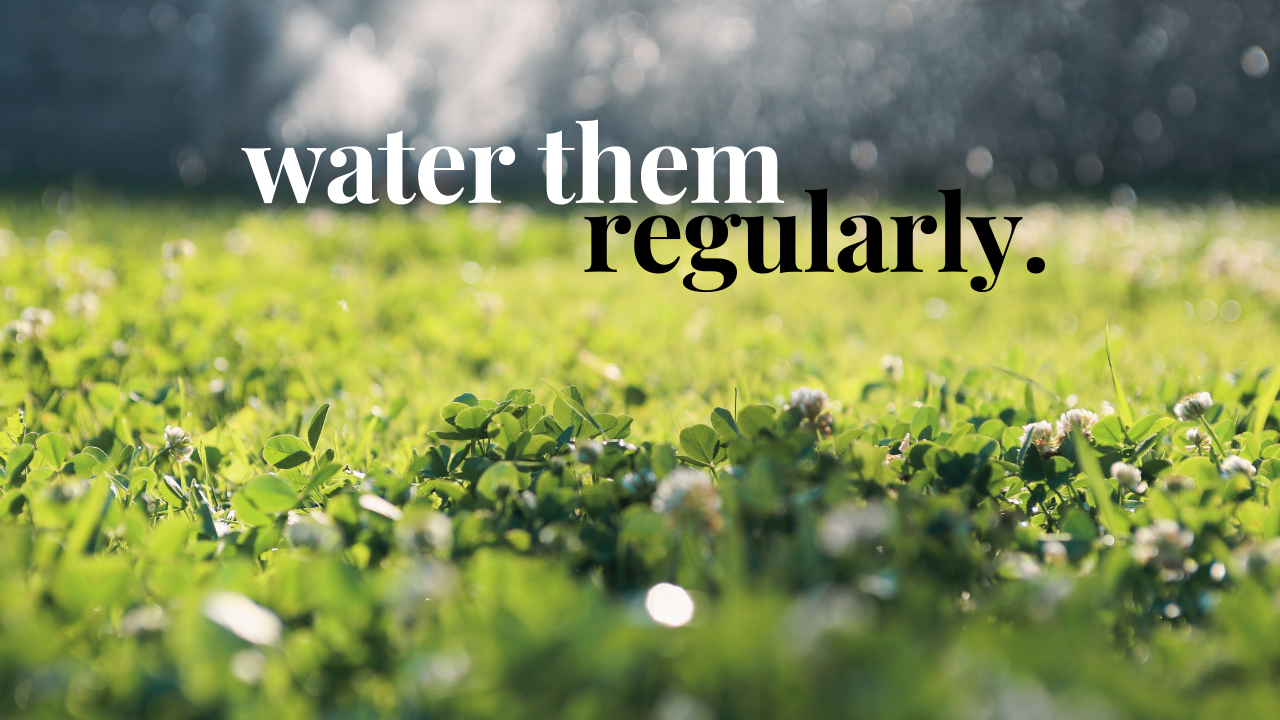A clover infestation is the bane of a picturesque, green lawn. So if you are currently struggling with stubborn clover taking over your backyard– you may want to get your clover problem under control at once. This isn’t to say having clover in your yard is terrible. If anything, clover brings several benefits to the table (although they are an eyesore if you’re aiming for an even, grassy lawn).
Fortunately, there are methods you can do to get rid of unwanted clover for good without putting your lush green grass at risk.
9 Methods to Get Rid of Clover
Here are our favorite proven ways to remove unwanted clover on the lawn.
1. Rip it out by Hand
If you’re dealing with small clover patches, you can opt to remove them one by one manually. Loosen the surrounding soil first using a spade before tugging the clover out (including the roots). It is crucial to remove the roots to prevent the unwanted clover from growing back on your lawn.
This is probably the easiest DIY method we have on this list. Not to mention, it’s a natural way to remove clover without damaging the rest of the grass.
2. Deprive It of Oxygen and Sunlight
Another natural method to eradicate pesky clover is by blocking it from getting the oxygen and sunlight it needs to survive. Take a plastic sheet or a garbage bag over the patch before securing the corners to hold it firmly in place.
In some cases, this should be enough to kill the unwanted clover after a few weeks. However, this method may also harm the healthy grass covered by the sheet.
3. Use a Vinegar Mixture
Another natural remedy involves using a vinegar-based mixture to eliminate the clover. Commonly, this approach will take you weeks of frequent spraying– but it is considered a more eco-friendly option than using weed herbicides with toxic chemicals.
Simply combine vinegar, water, and dish soap in a spray bottle. Once you locate the clover patches, spray the formula without including the surrounding healthy grass. Over time, the vinegar will dry out the clover leaves.
4. Nitrogen Boost
Since clover thrives in low nitrogen level soil, a straightforward way to eliminate it is to apply a fertilizer rich in nitrogen to the patches. Doing so will prevent the clover from spreading and taking over your lawn. This is effective, even if you deal with quite a lot of clover.
Other organic fertilizer alternatives are bone/blood meal, cow manure, liquid kelp, and earthworm castings. While these options are environment-friendly, it will take quite some time to eradicate the clover on your lawn.
5. Apply Organic Herbicide
Suppose you want to ensure zero risk of damage to the healthy grass around the clover patches. In that case, you may use ADIOS organic herbicide (Advanced Development In Organic Solutions) for efficient weed control. (Related: How To Fix A Yard Full of Weeds To Its Former Glory)
So, if you have pets and children who often play in the open yard, the ADIOS herbicide is safe and non-toxic. It’s also ideal for properties located near livestock farms and bodies of water.
Aside from clover, it can efficiently get rid of dandelion, ground ivy, yellow mustard, and other common lawn weeds. This organic herbicide also helps fight against invasive weeds like ragweed and poison ivy. You can place an order for ADIOS online or drop by your local home improvement store.
6. Adjust your Mowing Height (Higher than 3 inches)
Clover tends to thrive in areas where the grass is no more than 3 inches in height. This is because of their shallow root system that makes it ideal for them to grow low to the ground.
So, if you let the grass grow a bit more than 3 inches, you may prevent unwanted clover from spreading all over the area. Taller grass also helps block sufficient sunlight exposure to the clover.
7. Use Corn Gluten
Another material you can use is corn gluten, which effectively prevents clover from taking over your entire lawn. It disperses organic peptides, which stop the clover seeds from sprouting.
Important Note: Avoid applying corn gluten if you recently seeded your grass, as it may also prevent its normal sprouting process. But you can count on corn gluten to avoid harming the surrounding grass.
Ideally, spread about 20 lbs. of corn gluten meal per 1,000 square feet of your cover-infested lawn. Corn gluten is available for online purchase or bought at local garden centers.
8. Water Properly
The following method to discourage clover growth is maintaining the ideal moisture level. An excessively wet turf is suitable for weed seed germination, while thirsty grass is too stressed out, making it susceptible to weeds.

Most experts also recommend keeping a close eye on your lawn, as you water it deeply at least once or twice a week. You may want to adjust this schedule accordingly, especially if the property begins to look visibly dry or the grass growth seems somewhat stalled.
9. Seed the Bald Spots
Once you’ve done a few of the methods we’ve listed above to kill clover patches, you may want to focus on the visibly bare areas on the lawn. One popular solution is to lay down new grass seed immediately before covering it with a thin mulch layer.
Don’t forget to water the grass seed regularly to encourage proper growth and follow the right lawn care to prevent clover from making a reappearance.
Frequently Asked Questions
How do you control clover?
Proper fertilization, mowing high, adding corn gluten meal or a vinegar solution, hand-pulling, depriving it of oxygen and light, striking it with an organic pre-emergent herbicide, or using a conventional herbicide are all ways to control fertilizer.
How do I identify clover?
White clover, red clover, and strawberry clover are the most prevalent clovers in your yard. To specify:
Why is clover taking over my backyard?
Check to determine whether your lawn is suffering from one of the following concerns if clover plants are suddenly appearing in your yard:
Should you get rid of clover?
There are many benefits of keeping or even planting clover in your yard. Clover aids in soil nitrogen fixation, is beneficial to the environment, attracts pollinators, etc. Clover is a natural fertilizer because of its symbiotic relationship with microbes. Clover takes nitrogen from the atmosphere and releases it into the soil. Clover is a weed that outcompetes others.
What will kill clover but not grass?
A.D.I.O.S. selective organic weed control eliminates weeds but does not hurt your lawn grasses, similar to corn gluten meal.

